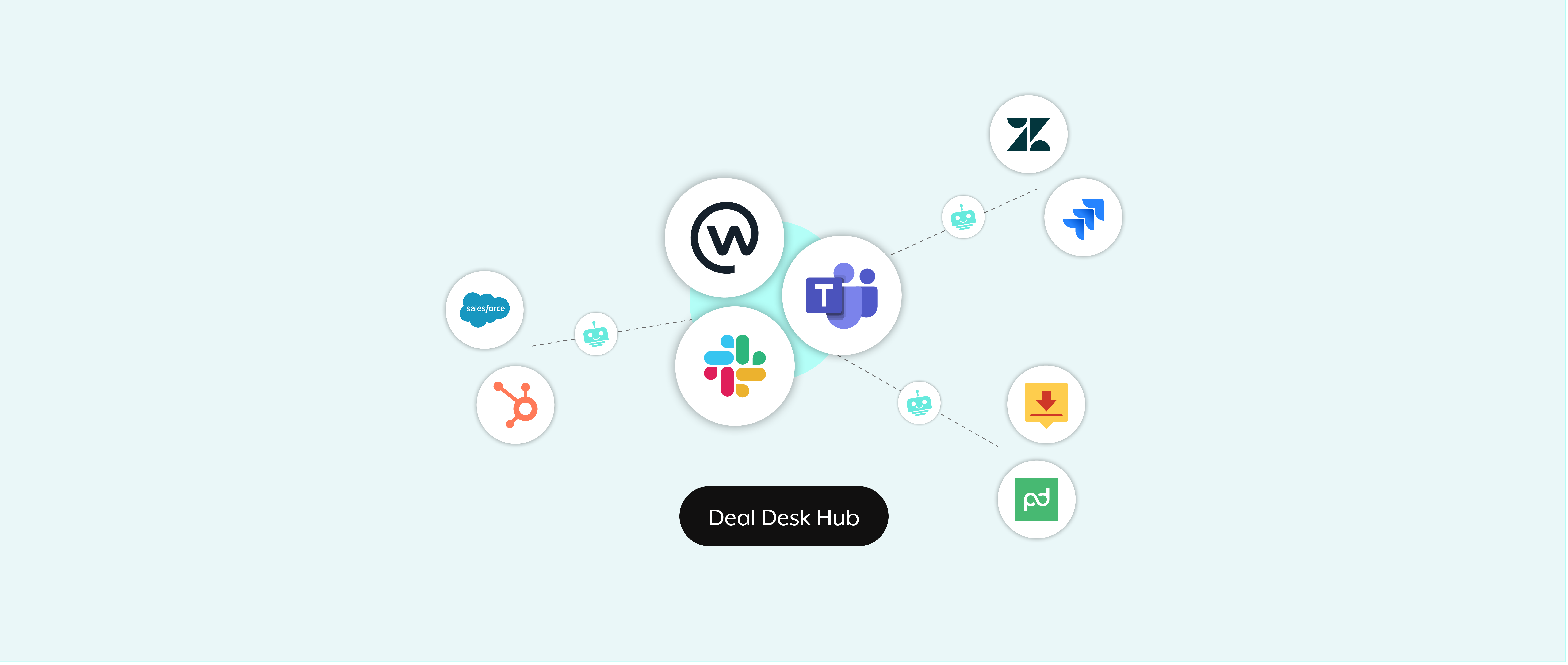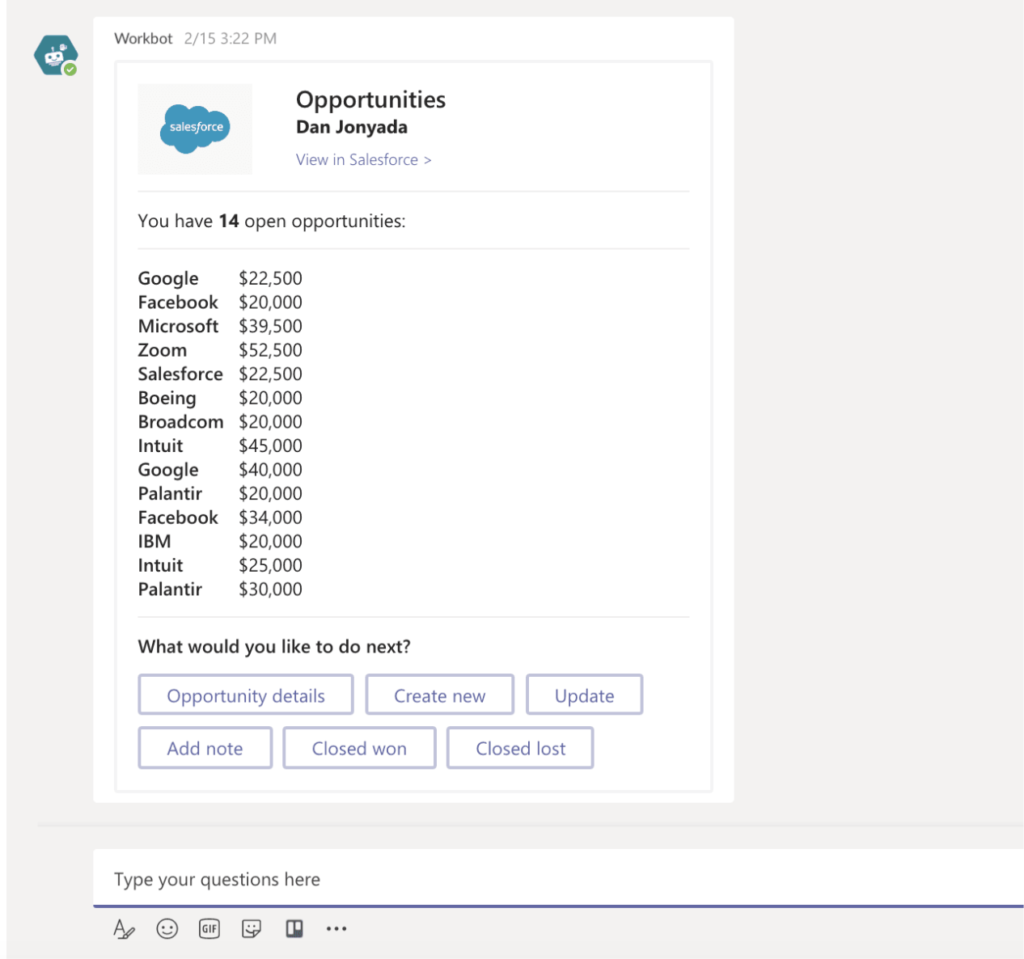If you’ve worked in and around sales long enough, you’ve probably heard that selling is a team sport. This maxim likely rings true for you and your team, as—generally speaking—sales teams often need the following before they can close high-value, complex deals:
- The product team’s buy-in on the proposed product roadmap
- The legal team’s sign-off on any redlines
- The customer success team’s approval of the level of support that’s promised
You can provide your sales reps with a deal desk to help them get these approvals quickly and receive the guidance they need to excel.
In this post, you’ll learn about the deal desk and its important features and benefits. Furthermore, we’ll talk about insights into the deal desk workflow and the challenges encountered with the deal desk. Additionally, we’ll look at how to measure deal desk performance and improvements, as well as how to get started with deal desk automation.
Let’s get started!
Related: Sales Automation: Here’s Everything You Need to Know Before Implementing It
What Is a Deal Desk?
A deal desk is a place where sales reps can discuss specific items related to their opportunities with colleagues in product, support, marketing, and legal, among other functions. The opportunities are typically high in dollar value (relatively speaking), and the topics that arise often carry significant implications beyond the sales organization.
It’s worth noting that a deal desk can take various forms. It can be anything from a recurring meeting with sales reps and their cross-functional stakeholders to a channel in a platform like Slack (which would include representatives from all of the relevant departments).
Why a Deal Desk Is Important
With the context above in mind, here are some reasons why implementing a deal desk is well worth the effort.
1. It Helps Employees Across Functions Improve Their Jobs
Sales reps benefit, as the deal desk allows them to get internal approvals and find the answers they need to move a deal forward—or stop it in its tracks. But it also benefits the other stakeholders who are involved. Here are just a few examples:
- Product managers (PMs) can uncover the specific product features that prospects value the most, which can help PMs shape their roadmap.
- Marketers can learn about the value props that resonate with their ideal customer profile and double down on them.
- Customer success can better understand the types of support that incoming clients need and prepare appropriately.
- Legal can pick up on common requests and make adjustments that mitigate future bottlenecks on their end.
Over time, these team-specific improvements should translate to even more sales and to higher customer retention.
2. It Ensures That Your Team Takes on the Right Customers Under Reasonable Terms
If your sales reps close big deals by making promises that your colleagues in product or customer success can’t support, your organization’s reputation and bottom line will suffer down the line. Customers will churn in droves, and their poor experiences will reach the masses through word of mouth and third-party review sites.
A deal desk helps your team avoid this doomsday scenario, as it provides a system of checks and balances: Your product team confirms whether the opportunities are a good product fit; your legal team confirms whether the terms of engagement are fair or are unnecessarily risky; your customer success team confirms whether they can support clients in a certain way, etc.
Related: How a RevOps team can help your organization scale

3. It Facilitates Reciprocation
By asking for and taking input from other departments, your sales reps can show that they respect their colleagues and value their opinions. This can lead to sales colleagues reciprocating in all kinds of ways, whether it’s legal reviewing documents after hours, customer success agreeing to a higher tier of support for certain clients, or product allowing for ad hoc product customizations.
4. It Provides Data-Driven Insights
A deal desk armed with data and analytical skills can become a driving force for revenue growth and operational efficiency. Knowledge of data will help identify trends and opportunities that will unlock valuable insights that will aid decision-making and improve sales processes. Sales teams can harness the power of data to make informed decisions, drive revenue growth, and improve sales efficiency.
By harnessing the power of data, deal desks can empower sales teams to make informed decisions, improve sales efficiency, and drive revenue growth.
5. It Helps with Scalability and Growth
A deal desk helps the sales team handle increased deal volume and complexity by creating a growth structure not hindered by volume or complexity. Integrating the deal desk with CRM systems enables quick data retrieval and real-time updates.
Deal Desk Workflow
There are various stages involved in a typical deal desk workflow. Some of the stages are as follows:
- Deal Initiation: The deal desk receives and logs deal requests submitted by the sales team, assessing their potential impact and complexity.
- Pricing and Evaluation: It evaluates and reviews the deal pricing against company pricing guidelines and consults appropriate departments to gather inputs.
- Negotiation and Approval: The deal desk analyzes contract terms and conditions and ensures compliance with legal regulations and corporate policies. Furthermore, it directs the contract for approval from an authorized committee.
- Review and Modification: The legal team modifies the contract based on the approved terms and conditions.
- Order Processing: Ensure accuracy in the processed orders and verify product availability.
- Post-Sales Analysis: Tracks deal performance and provides adequate support to customers.
Challenges Faced by the Traditional Deal Desk
Traditional deal desks face numerous challenges that can hinder their effectiveness and efficiency. Some of the challenges are:
- Error Prone: Manual data entry, contract review, and pricing calculations can lead to errors, which impact the accuracy of the reports and analytics.
- Manual Processes and Inefficiencies: Limited visibility and inconsistent processes can lead to delays and inefficiencies.
- Lack of Visibility: Poor real-time data and ineffective communications can hinder strategic planning.
- Scaling: Manual processes can become overwhelming and difficult to maintain as deals increase.
The deal desk can improve efficiency and enhance customer satisfaction by addressing the above-listed challenges.
Examples of Industries That May Require a Deal Desk
By establishing a deal desk, industries can centralize their deal support, risk management, contract review, and pricing strategies. Here are some examples of situations where a deal desk is valuable:
Telecommunication Companies
Telecommunication companies deal with complex and large deals involving customers who need unique support levels and network configurations. A deal desk handles high-value contracts with customized pricing that streamlines the process and ensures consistency.

Enterprise Software Companies
Companies selling software solutions to large organizations where their sales reps negotiate deals that involve multiple departments and also require input from legal and finance departments need a deal desk. With the deal desk, intricate negotiations, pricing, and approvals can be checked against the company policies while meeting the client’s needs.
Healthcare Companies
Health and pharmaceutical companies that negotiate large deals, especially with government agencies, often deal with regulatory conditions and unique pricing. A deal desk ensures compliance with regulatory bodies on complex pricing structures and volume discounts while maintaining profit.
Manufacturing Companies
Manufacturing companies selling or leasing equipment such as industrial machinery and medical devices often negotiate deals with payment terms and maintenance agreements. A deal desk can help to navigate complex pricing, financing options, and service agreements that ensure profitability.
Examples of situations that may require a deal desk
Some of the situations that may require a deal desk are:
- High-Value Deal: A situation where a company engages in complex and large deals requires a deal desk to meet all the terms and conditions and protect the company’s interest.
- Deal with Different Stakeholders: Any deal that involves numerous departments (legal, finance, etc.) needs a deal desk to coordinate the process to ensure a smooth process.
- International Deal: When dealing with international clients, the deal desk can help to navigate cultural differences and legal complexities.
Challenges of Implementing Deal Desk
Implementing a deal desk, a strategic tool for complex sales processes, can improve the efficiency and consistency of an organization’s deal management. However, its implementation can pose several challenges, as illustrated below.
- Resource Constraints: Investing in technology and hiring and training skilled deal desk professionals is costly in a competitive market.
- Integration: Integrating the deal desks with existing systems like finance platforms and CRM systems can be challenging and costly.
- Change Resistance: Because humans don’t like changes, the sales team may find it difficult to relinquish control over certain aspects of the deal process.
- Data and Reporting: Data accuracy and timeliness are vital. Hence, there’s a need to check data quality regularly, which is expensive and time-consuming.
Measuring Deal Desk Performance and Improvements
A deal desk helps the sales team streamline complex deals and hence ensures compliance and an accelerated sales cycle. Key performance indicators must be in place to gauge the deal desk’s effectiveness.
Efficiency Metrics
- Time to Quote: Measures the time taken to produce a quote or approve a deal. The faster the measured time, the better for a good customer service experience.
- Error Rate: Measures the rate of error in deal pricing, documentation, and other aspects. A lower error means accuracy and less rework.
Effectiveness Metrics
- Deal Size: This method measures the average size of deals closed, as the larger deal size leads to higher revenue.
- Revenue: Measures the company revenue before and after deal desk implementation.
- User Experience: Measures the satisfaction of customers, with positive feedback indicating a well-functioning deal desk.
Improvement Metrics
- Tool Adoption: This metric measures the adoption rate of new tools, with a higher adoption rate enhancing productivity.
- Training and Feedback: Regular training on pricing and legal clauses can empower the sales team to efficiently and effectively manage and close deals.
- Process Improvement: This process tracks the impacts of process improvements by the deal desk.
How Automation Can Supercharge Your Deal Desk
To keep those at your deal desk collaborating effectively, you can implement the following automation with an enterprise chatbot:

Empower Reps to Update Their Opportunities Easily
To help your reps manage the opportunities in their deal desk, you can allow them to update others within a tool they’re already using, like Teams or Slack.
Here’s how:
- Your sales reps type a command like “list opportunities” in the business communications platform via an enterprise chatbot.
- The chatbot searches for and retrieves the sales rep’s opportunities in your CRM platform.
- The chatbot lists out the opportunities for the rep in the business communications platform.
- The rep can select Update, which prompts them to pick the specific opportunity they’d like to edit.
- Once the rep submits their changes, the edits are automatically reflected in the opportunity’s page in your CRM.
Note: Steps 2 and 3 happen in real time.
This saves your reps time, as they don’t have to move to your CRM every time they need to update an opportunity. And, assuming the automation motivates reps to update their opportunities more often, everyone else who’s part of the deal desk benefits, as they can access the latest data when reviewing the opportunities.
Related: A guide to leveraging a sales chatbot
Streamline Internal Approvals
You can also use automation to help your sales reps request approvals with ease and to enable stakeholders to review and accept/reject any with the click of a button.
Here’s how it can work in the context of a rep requesting legal to review the contract’s redlines:
- A rep submits a deal desk request in their CRM.
- The request gets posted to a specific channel within your organization’s business communications platform.
- The approver is tagged in the post, and they can decide to accept or reject the request within the business communications platform, or review it further by clicking on the link to the opportunity (which is also included in the post).
- Once approved, the channel gets notified through another post.
You can improve your deal desk through automation in even more ways. To discover these additional use cases and to explore the ones above further, you can schedule a demo with one of our automation experts!
Getting Started with Deal Desk Automation
Deal desk automation is using technology and structured workflow to streamline and improve the efficiency of deal desk operations. To get started with deal desk automation, here are a few things that need to be done:
- Understand the needs: Observe the processes, such as manual pricing adjustment and approval wait time, and decide which tasks should be automated first.
- Choose an automation software: Do extensive research on the available automated software and pick the one that meets your needs and budget.
- Implementation: Implementation comes after picking your preferred software. This involves setting up workflows and integrating with your CRM.
- Training: Adequately train your staff on how to use the software, which will ensure everyone is correctly using the software.
- Set up rules and guidelines: To avoid unnecessary reviews, define clear criteria for approval thresholds.
Wrapping Up
This detailed guide taught you about the deal desk and its important features and benefits. You also gained insights about the deal desk workflow and the challenges encountered with a deal desk. Additionally, we looked at how to measure deal desk performance and improvements, as well as how to get started with deal desk automation.




